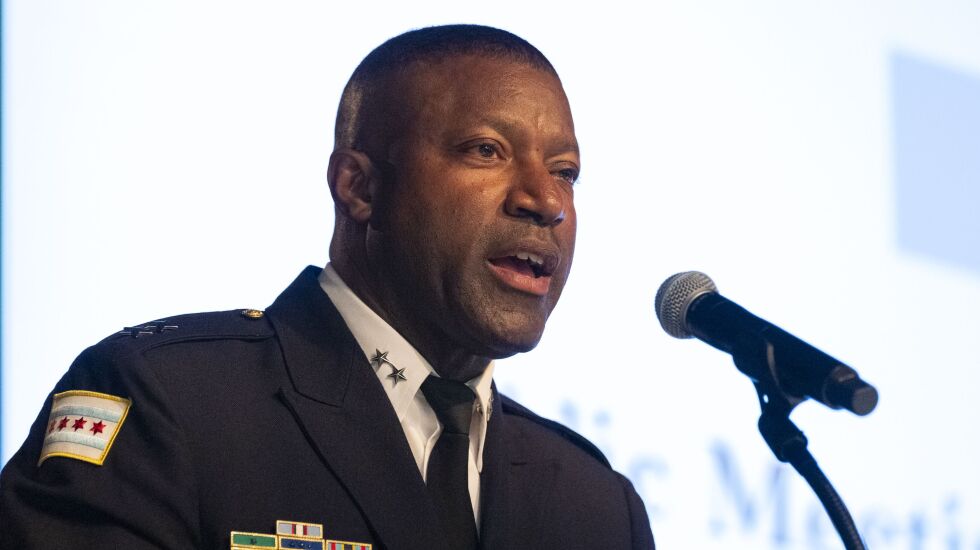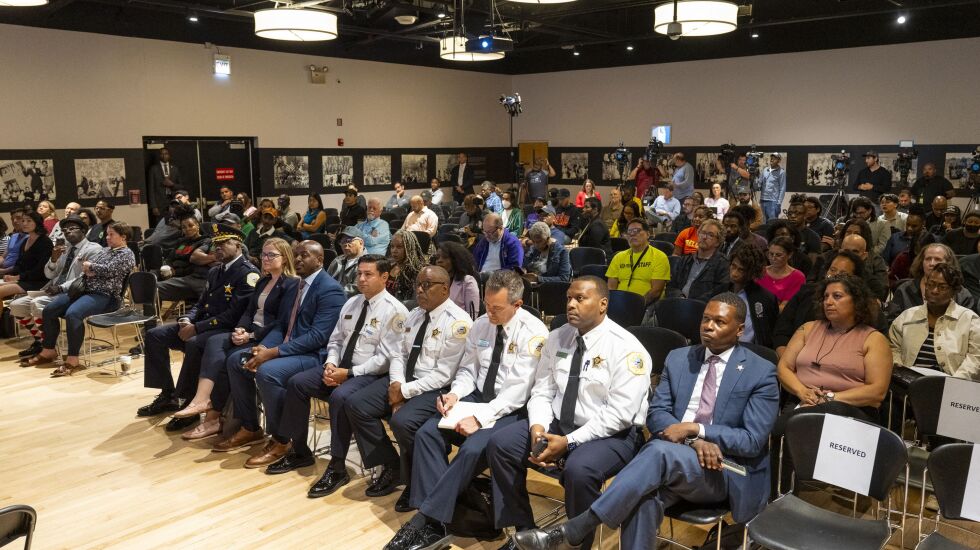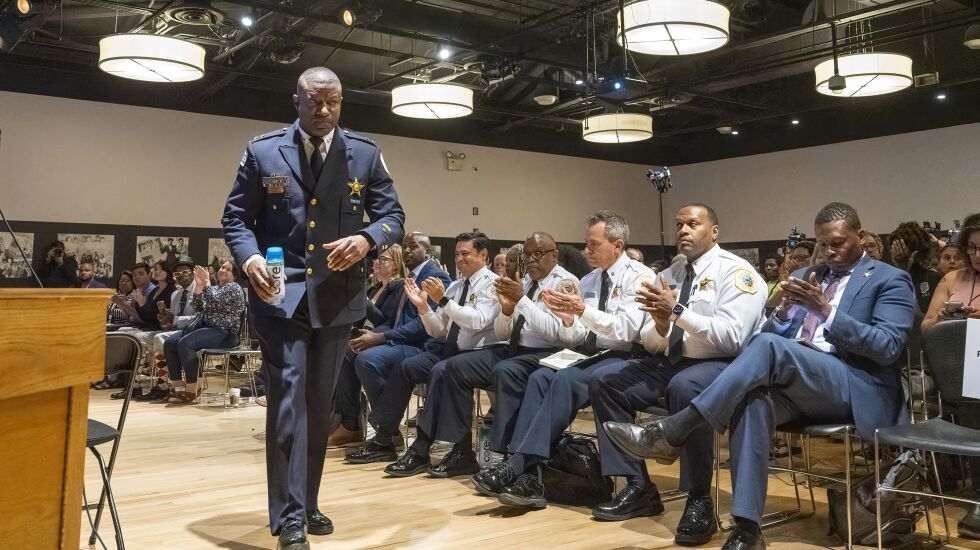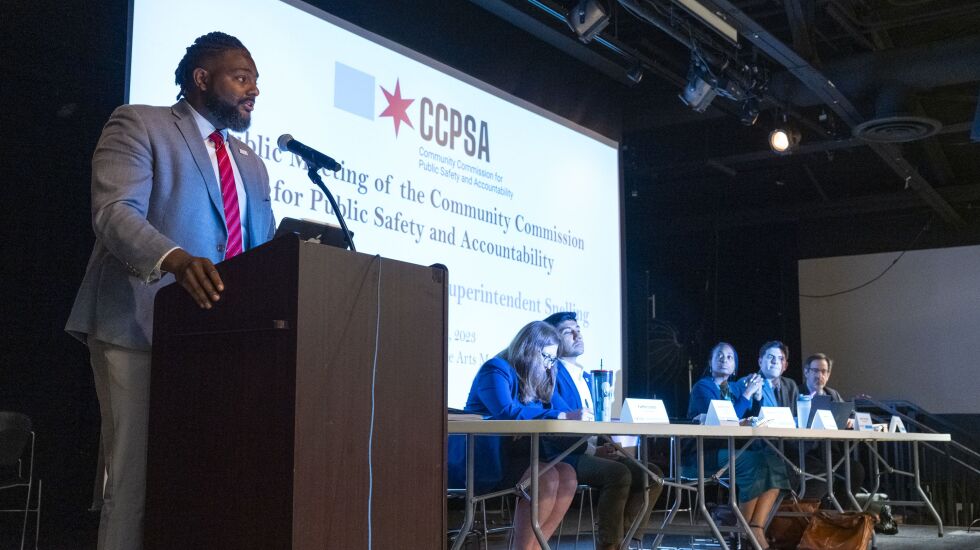
Larry Snelling, the nominee for top cop, asked the community to collaborate with police to help solve the city’s deep-rooted crime problems as he fielded questions from the public for the first time since his nomination.
“We can’t do this unless we do it together. I can’t help you if I don’t listen to you,” Snelling said during a forum Thursday in Pilsen.
The forum was held at the National Museum of Mexican Art and was organized by the Community Commission for Public Safety and Accountability, which conducted the exhaustive search that led to Snelling being chosen as next superintendent by Mayor Brandon Johnson.
“I’m committed to the people of Chicago, I’m committed to the officers who serve you, who go out every day to put their lives on the line to protect you,” Snelling said. “I want you to get to know those officers, I want those officers to get to know you. We have to be partners in this.”

Questions for the the 54-year-old counterterrorism chief came from commission members, local police district council members and community residents.
Anthony Driver Jr, president of the CCPSA, asked Snelling what his “non-negotiables” were in his role as chief of police. Driver said that Snelling had answered the question in the interview process, but he felt the public should have a chance to hear his response.
“One is my integrity, when it boils down to it, I’ll walk away from anything before I give up my integrity,” Snelling said. “I’ve made mistakes over the years, I’ve taken corrective action to build myself, to strengthen myself, to do a better job in whatever it is I decide to do just in life in general. One thing I realized is being able to sleep at night, being able to go home and look at yourself in the mirror is the most important thing.”
Snelling said his other non-negotiables were the safety of the community and “my officers.”
When asked by a community member if holding officers accountable for their actions would help build trust in the police, Snelling said there will always be people who don’t like those in uniform, but he won’t allow a few bad actors to tarnish the reputation of the department.
“When we have an officer who is not on this job faithfully, who engages in acts of willful wrongdoing, I will hold that officer accountable, because there are too many great officers on this job to allow one or two officers to sully their reputation and their names,” Snelling said. “These guys are working too hard for that, we will not tolerate that.”

Snelling, who has defended the use of the ShotSpotter gunshot detection technology in the past, was asked if he supported the mayor’s promise to end its use within the city. He declined to take a position on the issue, saying he knows a conversation with the mayor is ahead.
“The mayor will make that decision,” Snelling said.
Snelling also pledged to make the racial makeup of the police force more diverse if the community helps the department recruit more Black and Brown candidates.
Snelling must restore the trust of officers who quickly lost faith in David Brown, the retired Dallas police chief chosen by then-Mayor Lori Lightfoot. Many in the rank and file never believed Brown had their backs or understood Chicago.
His to-do list also includes speeding compliance with a federal consent decree, restoring trust between citizens and police, driving murders and shootings down and homicide clearance rates up and stopping a troubling spike in North Side robberies.
Snelling’s nomination must still be approved by the City Council.
The appointment was slated to go before the City Council on Friday morning, but the meeting was canceled Thursday afternoon by Ald. Chris Taliaferro (29th), the committee chairman, who told the Sun-Times he wanted more separation between the council’s proceedings and the work of the commission.
Snelling will therefore not be confirmed by the full council Wednesday. A committee meeting will be held later in the month, Taliaferro said.
Also at the meeting Thursday, the commission voted in favor of an order that would end the city’s use of the controversial and error-filled gang database, drawing a loud round of applause from the crowd.

The general order requires any future collection of information on Chicago street gangs to be implemented by general order and, therefore, ratified by the seven-member commission.
Three years ago, CPD unveiled plans to upgrade and remodel its gang database to eliminate racial and ethnic biases and mistakes pinpointed by then-Inspector General Joe Ferguson.
Those mistakes included two people listed as 132 years old and 13 people recorded as 118 years old.
“Given all the concerns and controversy around the gang database, our commission calls for more formalization, more transparency, and more accountability around the gang data practice,” Driver said, adding that the issue was personal for him, as his father was wrongly listed on the database.
“This is an important moment for Chicago, under CPD’s first-ever commission-nominated police superintendent, we have an opportunity to get this right,” Driver said. “There’s a way to do this without engineering a harmful and unfair database. With this vote I hope that we can truly bring some comfort and closure to all the Chicagoans who felt the harmful impacts of the gang database over the years.”
Contributing: Fran Spielman, Tom Schuba







